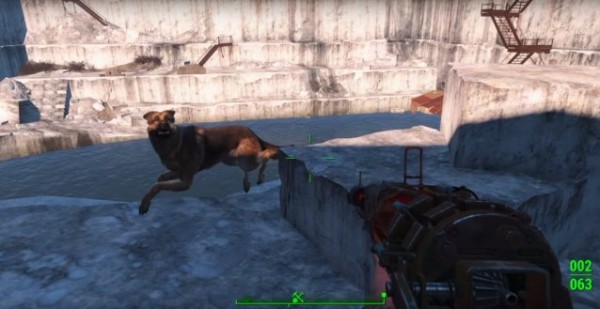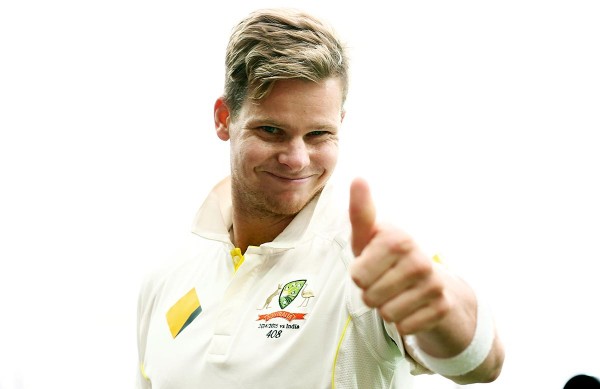
A gradual but inevitable descent into cricket-based loathing and bile.
A Fair And Even-Handed Critique Of Brendon McCullum’s Captaincy
Constant gushing praise from a besotted media? Check. Overzealous defence from self-affirming fan boys? Check. No, we’re not talking Brendon McCullum, but Fallout 4 and Bethesda. But we could be. We’d actually like to say nice things about Mr McCullum this time though, and are honestly big fans of his captaincy, in that it promotes attacking cricket which results in games which are pushed towards a conclusion one way or the other. This is a very good thing. But it does not mean his style of captaincy is above reproach, and so here we would like to point out some areas where we think he could improve. Since if Shane Warne somehow thinks he is an authority on Test captaincy (Tests captained: zero), then why can’t we be too?

What do we know? Perhaps in a post-apocalyptic future dogs swimming in mid-air will be a common sight.
Let’s start by talking about Michael Clarke. Now that he has retired we can safely get past all the crap that surrounded his career and get on with actually looking at his captaincy. Although those blond tips were a shocking choice, and the less said about the earring the better, Clarke was a good Test captain, at least on the field, and was never afraid to try things to wrest momentum away from the opposition. He only, however, became a great Test captain when Darren Lehmann took control of the Australian Test team.
Immediately prior to Lehmann taking charge Clarke’s deficiencies as captain were laid bare. He was far too attacking, to the point that games were being thrown away in desperate pursuit of a result, when patience might have served better. South Africa’s second innings in the third Test in 2012 is perhaps the most dramatic example, when, after conceding a first innings deficit and chasing a win that would propel Australia to number one in the rankings, Clarke went for quick wickets and instead saw South Africa pile on 569 runs at a run rate of over 5.
Move forward a few months and the same problems occurred: chasing quick wickets Clarke threw away strong positions by allowing Indian batsman to score at run-rates consistently near to four an over. Obviously Australia had more problems than just an over-attacking captain on that tour, such as the inability to bat Steven Peter Devereux Smith in more than one position in the batting order (we’d have batted him at 2-6, with Ed Cowan making up the numbers in the top six in every possible way), but Clarke’s over-eagerness to force a result culminated in Australia getting blown out of the water time and time again.

Have we mentioned before that we are big fans of this man? Oh, we have? Well carry on then.
With Lehmann introduced into the mix, this quickly came to a halt, and in the 2013 Ashes, and then even more emphatically in the return series, the opposition’s scoring rates came to a juddering halt. With Siddle, Harris and Lyon keeping things tight and Johnson allowed to do his thing in short spells, Australia found a pretty irresistible combination. Even when the wheels came off in the 2015 Ashes they were never quite blown out of the water like they had been in 2012/3.
This now is McCullum’s issue. Incessant attacking may make for exciting games, but it’s killing the Kiwis chances of keeping the opposition under the thumb. At the Gabba Australia scored 556 runs at more than 4 an over, while the Kiwis gave up the highest first day run total ever conceded at the ground. At Lord’s six months earlier, they likewise allowed England to race along at nearly 4 an over in the first innings, and about the same in the second. All the while McCullum is constantly tinkering with things trying to desperately conjure up a wicket.

Although this will forever remain our favorite Gabba massacre.
The solution, as far as we can see, is pretty simple. New Zealand need a Darren Lehmann. Maybe not as a replacement for Mike Hesson, exactly, but someone who can at least come in, rein McCullum back a bit and show how sometimes a strong defence is better than outright attack. A lot has been made of Shane Bond giving up national coaching duties, and his subsequent replacement by Dmitri Mascarenhas, whose main claim to fame is that he plays poker with James Bond. Apparently. Whatever the case, Bond leaving after the 2015 World Cup seems to have coincided with a sharp decline in the Kiwi’s performances with the ball. The back room doesn’t seem to be working at all as well as it ought for the Kiwis and it certainly looks like McCullum is in need of more guidance than he is currently receiving.
Who that person might be, we have no idea. We don’t really know a lot of famous Kiwis. Other than Richie McCaw, and the extras from the Lord of the Rings movies. But you can hardly call up the guy who played the orc third from the left in the Battle of Helm’s Deep scene to fix your national cricket team. In which case we might suggest that the Kiwis look at poaching one of those ever popular Australians, and like how the South Africans have turned to Michael Hussey, perhaps Ricky Ponting might be willing to lend a hand. They could even spend some of the money they are paying Peter Jackson to not make any more Hobbit movies on hiring him.

No Comments
Post a Comment